PARA ESPAÑOL HAZ CLIC AQUI
The Gospel of Mark
A deeper dive into our current series
Updated Weekly
- Week 1 (May 7th)
- Week 2 (May 14th)
- Week 3 (May 21)
- Week 4 (May 28)
- Week 5 (June 4th)
- Week 6 (June 11th)
- Week 7 (June 18th)
- Week 8 (June 25th)
- Week 9 (July 2nd)
- Week 10 (July 16th)
- Week 11 (July 23)
- Week 12 (July 30)
- Week 13 (August 6th)
- Week 14 (August 13th)
- Week 15 (August 20th)
- Week 16 (August 27th)
- Week 17 (September 3rd)
- Week 18 (September 10th)
- Week 19 (September 17th)
- Week 20 (September 24th)
- Week 21 (October 1st)
Week 1 (May 7) : Mark 1:1-20
“The Beginning of the Gospel of Jesus”
- Jesus is a well-known figure in culture, whether you are a Christian or not. What makes Jesus unique? How is Jesus described in Mark 1? (Look at verses 1,7-8,11). How would you describe him?
- At the beginning of Mark we see three big events that “mark” the beginning of Jesus’ ministry: his baptism, his temptation in the wilderness and calling his first followers. How did each of these prepare Jesus before he launched his ministry?
- The opening verses of Mark are like a prologue that opens a book and introduces us to the story that is to come. Just from these opening sentences, what do you expect from Jesus? What kind of things do you anticipate that he will do?
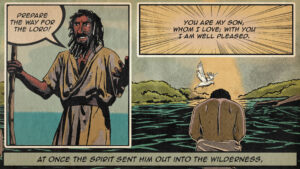
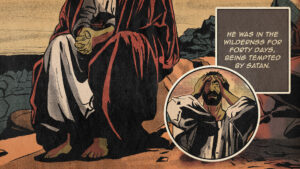

Here are some things to do, think and pray about in the week ahead:
- As we begin the book of Mark, it’s helpful to get a big picture of the whole book—who wrote it and why and how it all fits together. One easy way to do that is to watch this short video from the Bible Project. And if you’re up for a bit of a challenge, try to read the whole book from start to finish in one sitting. Mark is short—only 16 chapters—and it takes about an hour to read.
- Mark opens with the statement that Jesus Christ is the “Son of God”, and Mark will spend the rest of the book defending this assertion. In culture today, this is a radical claim. People are much more comfortable saying Jesus is a good moral teacher or that he showed us one way (among many) to understand who God is.
In Mere Christianity, C.S. Lewis famously wrote that Jesus didn’t give us these options:
“A man who was merely a man and said the sort of things Jesus said would not be a great moral teacher. He would either be a lunatic… or the Devil. You must make your choice. Either this man was, and is, the Son of God, or else a madman or something worse. You can shut him up for a fool, you can spit at him and kill him as a demon or you can fall at his feet and call him Lord and God, but let us not come with any patronizing nonsense about his being a great human teacher. He has not left that open to us. He did not intend to.”
(Mere Christianity, p. 56)
Think on who Jesus is to you. Do you trust he is the Son of God? Why or why not?
Week 2 (May 14) : Mark 1:21-2:13
“Jesus Demonstrates his Authority”
- The part of Mark we’re looking at this week begins and ends with the proclamation that Jesus has authority (see Mark 1:21 & 2:10). Define ‘authority’. What things do we see Jesus having authority to do in these stories? How do people react to Jesus’ authority? Do different groups react in different ways?
- Mark 1:35-39 seems out of place in the midst of all the healings described before and after it. Why would Mark include these details here? Is there anything we can learn about Jesus’ actions that is important for our own lives?
- Look more closely at the story of the paralytic in Mark 2:1-12. What do you think people expected Jesus to do when he saw the paralytic? What did he do instead? Imagine how various people reacted to Jesus’ statement. (Think of the people watching, the paralytic, the paralytic’s friends, and the scribes/religious leaders.) What does this story teach us about Jesus, his authority and how he views sin?

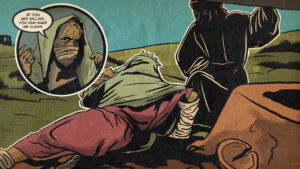
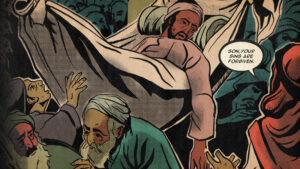
Here are some things to think and pray more about in the week ahead:
- Mark builds on his proclamation that Jesus is the Son of God (Mark 1:1) by then showing all the things that Jesus has authority over. Think on the implications of this in your own life. Name one way you could live differently this week because Jesus is the Son of God and holds all authority in the heaven, on earth and especially in your life and circumstances.
- Jesus drew close to many people who were invisible or even outcast in society (the sick, oppressed, disabled and poor). Consider who you see throughout your week and take one specific step towards someone who is outside your usual circle.
Week 3 (May 21) : Mark 2:14-3:30
“Jesus Confronts Legalism”
- This week in Mark, we see Jesus confronting the religious leaders of his day (called the scribes or Pharisees). What were the leaders’ specific complaints against Jesus? (See Mark 2:7,16,18,24 & Mark 3:1,22.) Why do you think they reacted this way?
- As Jesus ministry grows, we start to see crowds coming to him. What sort of people were in the crowds ? (See Mark 2:15 & 3:10). Why do you think they were coming to Jesus? What was he doing for them? How do you think the religious leaders reacted to Jesus’ actions and his growing popularity?
- Look back at the first three chapters of Book of Mark to what we’ve seen Jesus do so far. How have Jesus’ actions gone against cultural and religious norms of his day? List at least 5 specific ways. Can you think of any modern parallels of Christian norms and traditions that may actually hinder instead of helping people follow Jesus?
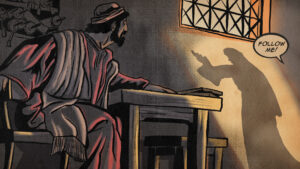

Here are some things to think and pray more about in the week ahead:
- Stop and consider any ways you find yourself thinking or acting legalistically like the religious leaders of Jesus’ time. What stirs up this tendency in you? Spend five minutes talking to Jesus about it by confessing your sins and asking him to reveal ways that you are missing his grace for yourself or others. Then stop and listen quietly for a few minutes. Allow him time to speak to you.
- If you are following Jesus, you are called to be countercultural. This means that you aren’t pulled along by the world’s norms and values or even some religious cultural norms. What is one radical thing you can do this week that would reflect something Jesus did and the way he loves people?
Week 4 (May 28) : Mark 3:31-4:34
“The Parables of Jesus”
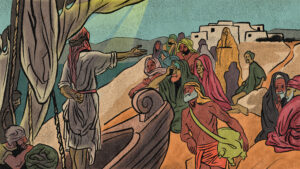 Read Mark 4:1-20. What does each thing in the parable represent? Who is the sower and what is the seed? What are the four kinds of soil? Think on your own life. What kind of soil are you? Even if you are Christian, and the seed of the Gospel has been planted in your life, you can still be tempted to have a heart that reflects the first three soils. What soil best illustrates how you are tempted to live sometimes? Why is your life not be as fruitful as it could be?
Read Mark 4:1-20. What does each thing in the parable represent? Who is the sower and what is the seed? What are the four kinds of soil? Think on your own life. What kind of soil are you? Even if you are Christian, and the seed of the Gospel has been planted in your life, you can still be tempted to have a heart that reflects the first three soils. What soil best illustrates how you are tempted to live sometimes? Why is your life not be as fruitful as it could be?- Look again at Mark 4:1-25. What word do see repeated again and again? Why do think Jesus repeats this word? (Up to 9 times in some translations!) What does he want people to do? What sort of things would someone do if they wanted to obey Jesus’ repeated command from these verses?
- Jesus tells two more parables about seeds in Mark 4:26-32. How are these parables similar to one about the four soils and how are they different? How can these parables guide and encourage the ways we serve others and especially how we spread seeds (or build bridges) to connect people to dynamic life in Christ?
Here are some things to think and pray more about in the week ahead:
- Meditate on this quote from St. Augustine, a famous 5th Century Church Leader and Theologian:
 “Change your ways while you can; turn the hard places with the plow. Remove the stones from your field and dig out the thorns. Be unwilling to have a hard heart, such as makes the Word of God of no effect. Be unwilling to have a thin layer of soil, in which love won’t strike a deep root. Don’t choke the good seed with worldly anxieties and greedy ambitions when it is being scattered for your good. When God is the sower and we are the ground, we are called to work to be good ground.”
“Change your ways while you can; turn the hard places with the plow. Remove the stones from your field and dig out the thorns. Be unwilling to have a hard heart, such as makes the Word of God of no effect. Be unwilling to have a thin layer of soil, in which love won’t strike a deep root. Don’t choke the good seed with worldly anxieties and greedy ambitions when it is being scattered for your good. When God is the sower and we are the ground, we are called to work to be good ground.”
(St. Augustine’s Sermon on Matthew 13, p. 292 of The Works of St. Augustine, Part 3: SERMONS)
Think about your life. How can you “work to be good ground” ?
Try using a different part of your brain to help you mediate on the parable of the four soils. Create a sketch of Jesus’ teaching. Show the short, scrawny roots that can’t reach the living water of Christ (Mark 4:17). Illustrate what the thorny weeds of worry, greed and desire do when they choke out the plants trying to bear fruit (Mark 4:19). Don’t worry what your drawing looks like. Use this time to think about the parable in a deeper way.
Week 5 (June 4th) : Mark 4:35-5:20
“Controlling Chaos”

 Read Mark 4:35-41. Why do the disciples wake Jesus up when the storm comes? How do they feel after Jesus calms the storm? Did their emotions change? Why or why not? Look back over the passage and consider if Jesus knew they would go through the storm. If he did, why would he do that? What does this story mean for you and the storms you face in your life?
Read Mark 4:35-41. Why do the disciples wake Jesus up when the storm comes? How do they feel after Jesus calms the storm? Did their emotions change? Why or why not? Look back over the passage and consider if Jesus knew they would go through the storm. If he did, why would he do that? What does this story mean for you and the storms you face in your life?- Look at Mark 5:1-13 and imagine the scene in your mind. Is it noisy or quiet? Is it calm or chaotic? Do you see any similarities between this story and the one before it (Mark 4:35-41)? Do you see any differences? What do we see Jesus doing in both situations?
- In Mark 5:14-20, you see several different reactions to Jesus casting the demons out of the man. How do various people respond? Why did Jesus not allow the healed man to come with him and the other disciples?
Here are some things to do, think and pray about in the week ahead:
- The disciples had already seen Jesus heal people and cast out demons, yet they did not expect him to be able to control the weather and the sea. Jesus keeps surprising them as they get to know him more. Think about your own life. How has your view of who Jesus is and what he can do changed the longer you’ve known him? How has he surprised you?
- This passage in Mark is all about people experiencing fear at things that are chaotic and out of their control. What feels out of control in your life? Where does it feel like God doesn’t care that you’re in a storm? Close your eyes and imagine Jesus saying to the chaos, “Peace! Be still.” Try praying this prayer: “Even in this storm, I will trust that you love me, you see me and you are in control. Jesus, help me to not be afraid, but have faith in you and your power.”
- Listen to Jennie Allen’s Made for This podcast where she interviews CIA operative Jamie Winship podcast on “Freedom from Fear”: https://www.identityexchange.com/blog/part-3-of-3-with-jennie-allen-finding-freedom-from-fear.
Jamie worked for the CIA for over 30 years and his stories of how God shows up when he faces his fears are powerful. Jamie tells incredible stories of how Jesus led him in his work and inspires each of us to find our true identity when we realize we have nothing to fear because Jesus is with us just like he was with the disciples in boat.
Week 6 (June 11th) : Mark 5:21-6:6
“The Impact of Faith”
- The two stories this week of the bleeding woman and Jairus’ daughter are intertwined with one another. What are some parallels (see Mark 5:25 & 42, 34 & 36)? Why did each of their situations seem hopeless? Who showed faith instead of hopelessness? Why do you think they were able to find hope and trust in Jesus (see Mark 5:27 & 36)? When is a time you had faith because of what you knew Jesus had done in the past? Is there a time you’ve just had to have faith because he told you to?
- In both of these situations there are crowds and commotion (see Mark 5:21,24 & 38). Did Jesus focus on the crowds or the individual? What does this tell you about who God is and how he sees people?
- Read Mark 6:1-6. Where does this story take place? How are the people’s expectations about Jesus different than the bleeding woman’s or Jairus’? (Compare Mark 5:34 & 6:5, if needed). In your own life, how does familiarity with Jesus actually work against faith instead of build it?



Here are some things to think and pray more about in the week ahead:
- In Nazareth, Jesus’ hometown, people who were familiar with him took offense to his teaching. (See Mark 6:3). The same thing happens today, especially with people who hear Jesus’ teaching but don’t experience his power in their lives. Think of some possible objections people have to Jesus’ teaching today. Pray for someone you know who has rejected Jesus; maybe it’s your ‘One’ that you are building a bridge to. Ask God to show them His power and for the Spirit to help them reconsider who Jesus is.
- Last week we focused on faith over fear. This week our focus is faith over unbelief. Which is a bigger temptation for you? Are you more likely to be afraid of something scary and difficult or are you more likely to assume that Jesus either isn’t able or isn’t interested in working in challenges you face? Either way, the antidote is faith.
Hebrews 11:1 says, “Faith is the assurance of things hoped for and the conviction of things not seen.” Memorize this verse and apply it to a situation where you are fearful or where you don’t believe God is at work. Be assured that God is greater than anything you fear and that He is working in ways that you may not be able to see yet.
Week 7 (June 18th) : Mark 6:7-45
“The Kingdom Advances”
- Read Mark 6:7-13. What does Jesus tell the disciples to do? What are they not supposed to do? How does he prepare his disciples for what they might face (Mark 6:10-11)? How can we apply Jesus’ words and the disciples’ mission to our own lives as people who are sent out to build bridges to connect others to Jesus?
- What did Jesus tell his disciples to proclaim (Mark 6:12)? How does that connect to this “flashback” to John the Baptist and King Herod? (Look back to Mark 1:4 & 14 & Mark 6:17-18). The word repentance in Greek is “metanoeo” which means to “change your mind or to think differently”. Mark makes sure to connect the gospel and salvation to not just faith or belief (like we looked at last week), but also repentance. Why do you think Jesus says we have to “repent and believe in the gospel” (Mark 1:14)? How does thinking about things differently drive you to believe and trust in Jesus? Changing your mind also drives changed behavior. What could this have meant for King Herod? Clearly, he respected John the Baptist (see Mark 6:20), but he didn’t listen to his call to ‘repent’. Why not? Where in your life are you in need of repentance?
- The story of the Feeding of the 5000 is familiar to many people, and outside of the resurrection, it’s the only miracle of Jesus recorded in all four gospels. Why do you think all four gospel writers included it? Mark would have assumed that his original readers would connect this story to another time when God provided food from nothing, recorded in Exodus 16:1-21. How are these two stories similar? What might the disciples have been thinking as they we giving out the bread and fish? How would this experience have made them think about Jesus in a different way than they had up until now?
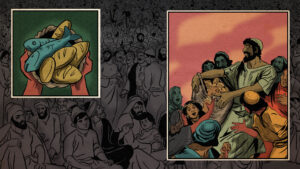

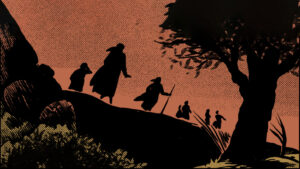 Here are some things to think and pray more about in the week ahead:
Here are some things to think and pray more about in the week ahead:
- The Chosen (new.thechosen.tv) is a streaming series the dramatizes the stories of the gospels and helps illustrate what it may have felt like to experience them. This week, check out Season 3, Episodes 4 & 5 titled “Clean” and see how it tells the stories of Mark 5 and 6 and the sending out of the disciples and the healings of the bleeding woman and Jairus’ daughter. (Check out this scene from Mark 6:7-13 here: link.angel.com/2EplKFAyKzb.)
- In both Mark 6:7-13 and Mark 6:30-44, we see Jesus taking regular people and limited resources and doing amazing things. Think about a time you’ve seen him do this in your life. Then tell someone—in your Bridge Group, a family member or friend or even someone who doesn’t know Jesus—about a time God showed up for you when you didn’t have enough or when you didn’t feel able enough to be used by Jesus.
Week 8 (June 25th): Mark 6:45-7:23
“Kingdom Above Religion”
- Read the story of Jesus walking on water (Mark 6:45-52). What do you learn about Jesus? Why do you think he walked out to the disciples on the water (see verse 48)? What could this story reveal about how Jesus is involved in our struggles? When Jesus says, “Take heart; it is I” he is literally saying “I am.” Why might Jesus use those words (see Exodus 3:14)? How does Jesus saying “I am” relate to the previous story and Mark saying the disciples “did not understand about loaves” (verse 52)? What does Mark want us to understand about who Jesus is?
- Mark 6 starts with people in Jesus’ hometown of Nazareth rejecting him, and the chapter ends in Gennesaret, a town where there is no record of him going before. How does his ministry differ in the two towns? How are people’s attitudes different in Nazareth and Gennesaret? Are there ways that people react to Jesus similarly today depending on if they are familiar with him or if they’ve never encountered him before?
- In Mark 7, the focus turns back to the Pharisees and scribes. (Look back at Mark 3 for the last place Mark recorded their interaction with Jesus.) This time Jesus calls them hypocrites. Define ‘hypocrite’ in your own words. Why does Jesus call the religious leaders ‘hypocrites’? Who or what are they focused on? What does Jesus to focus on instead?

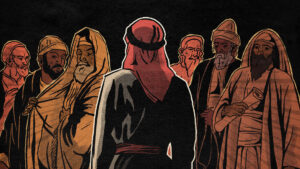 Here are some things to think and pray more about in the week ahead:
Here are some things to think and pray more about in the week ahead:
- Brennan Manning writes in The Ragamuffin Gospel: Good News for the Bedraggled, Beat-up and Burnt-out:
“The Word we study has to be the Word we pray. My personal experience of the relentless tenderness of God came not from exegetes, theologians, and spiritual writers, but from sitting still in the presence of the living Word and beseeching Him to help me understand with my head and heart His written Word. Sheer scholarship alone cannot reveal to us the gospel of grace . . . (it comes from) Jesus Christ personally and directly. When the religious views of others interpose between us and the primary experience of Jesus as the Christ, we become unconvicted and unpersuasive travel agents handing out brochures to places we have never visited.”
This week, think on Manning’s words. Consider that it is far easier to notice hypocrisy in others than it is to see it in ourselves. When reading about the Pharisees or pointing out self-righteous, religious people we know, we can easily become judgmental and unloving. As Christ followers, that’s hypocritical! Spending time with Jesus in prayer and in the Word is our only hope to break the cycle of hypocrisy and love every person like Jesus commands.
- This section of Mark focused on our hearts and what’s within us. We see the disciples being hard-hearted (Mark 6:52), and then Jesus accused the religious leaders of not realizing that it’s the attitude of our hearts, not the just our behaviors that are sinful and separate us from God. Take a minute to be silent before God. What is the state of your heart? Have you allowed Jesus to change your attitude recently? In what ways are you being hard-hearted towards God, yourself or others? Confess them, then receive the forgiveness that Jesus offers (1 John 1:9).
Week 9 (July 2) : Mark 7:24 – 8:21
“Clarifying Kingdom Reality”
- Read Mark 7:24-8:10 and note any place names that you discover. What do they have in common? (Use a Study Bible or Google the place names if needed.) What do we learn about Jesus that he is doing miracles in these regions? Why is it important for the disciples to experience Jesus doing ministry in these regions?
- The healing of the deaf and mute man in Mark 7:31-37 takes place in the Decapolis. Look back at Mark 5:1-20 to see where Mark last mentions this region. List all the things that Jesus has done in this region. How did the people react and why? (Read Isaiah 35:5-6 to understand in a deeper way why the people were amazed.)
- In the feeding of the 5000 (Mark 6:30-44) the disciples came to Jesus with the need, but in the feeding of the 4000, Jesus came to the disciples with the problem (Mark 8:2-3). Why did Jesus come to them this time and how did the disciples react? Looking at Mark 8:14-21, what was Jesus hoping the disciples’ reaction would be?
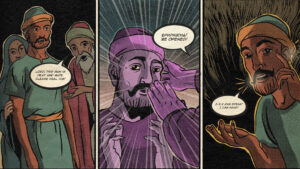
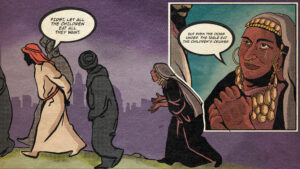

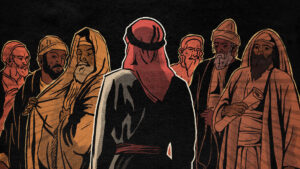 Here are some things to do, think and pray about in the week ahead:
Here are some things to do, think and pray about in the week ahead:
- When reading the story of Jesus with the Syrophoenician woman (Mark 7:24-30) many people are surprised at Jesus’ seemingly harsh initial response to her. Although we may miss the cultural implications of what he’s saying about Jews and Gentiles, we may also be misunderstanding Jesus’ tone. Biblical scholar F. F. Bruce comments on this passage saying:
“What if there was a twinkle in Jesus’ eye as He spoke?. . . The written record can preserve the spoken words; it cannot convey the tone of the voice in which they were said. Maybe the tone of voice encouraged the woman to persevere.”
Think on what tone you imagine Jesus having when He speaks to you. Is it harsh or gentle? Joyful or angry? Serious or gentle? Ask God to reveal to you His loving, true tone when He’s speaking to you and to help you to hear Him clearly.
- When faced with 5000 and then 4000 hungry people, the disciples only saw obstacles, while Jesus saw opportunity. What about you? What obstacles keep you from opportunities to minister to others? Fear of not having enough? Fear that you are not enough? Try praying this:
Jesus, ___________seems like an impossible situation, and I don’t know what to do. But you do! Show me how you see this situation and then use me to partner with you to do something that I could never do without you. I’m on the lookout for how you are going to work!
Week 10 (July 16) : Mark 8:22-9:13
“Identity and Priority Revealed”
- Mark 8:27-38 is often called the hinge or pivot point of the Gospel of Mark by biblical scholars. Why? What happens in these verses that turns the Gospel of Mark in a new direction? What is the key message in these verses about Jesus’ life, identity and purpose?
- Who is Jesus speaking to in Mark 9:34-38? Given that everyone he’s speaking to won’t be crucified, what do you think his teaching means? How does “denying yourself, taking up your cross and following Jesus” connect to Jesus’ own suffering and death (Mark 8:31)? How does it connect to Jesus’ teaching on losing your life and the value of your soul?
- Read Mark 9:2-13 and then look back at Jesus’ baptism in Mark 1:9-11. What similarities and differences can you find between Jesus’ baptism and His transfiguration? Who was at each event and why were they each important? Who spoke in each event and to whom? For a deeper dive, look at Matthew’s account of the transfiguration (Matthew 17:1-13).


 Here are some things to think and pray more about in the week ahead:
Here are some things to think and pray more about in the week ahead:
- Put in your own words what it means to “deny yourself and take up your cross”. How would you explain it to a 10-year old or someone who isn’t a Christian? Is it simply not buying something you want or putting up with an annoying co-worker? If Jesus’ teaching was all about the Kingdom of God being here and now (Mark 1:15), then why are his followers to deny themselves? Name one way you live differently because Jesus is the king of your life.
- This week we looked at the turning point in the book of Mark, where something significant happens that means everything after it will be different. Think on the pivot points in your own life where your life was changed forever—maybe it was an achievement, a decision or a life event like a marriage, move or birth of a child. Where can you see God at work in these life-changing moments? Thank Him for being at work in your life whether you see Him clearly or not.
Week 11 (July 23) : Mark 9:14-50
“The Power of Belonging”
- Read Mark 9:14-29 and think of it through the eyes of the disciples. What are they feeling? (Look back at Mark 6:7-13 for context. Also consider the feelings of the 9 disciples who were not present at the Transfiguration.) What does Jesus teach the disciples? How can His words be applied to your life in places where you are feeling frustration, confusion or shame?
- In Mark 9:35, Jesus says “If anyone would be first, he must be last of all and a servant of all.” Describe being a servant. Why do you think Jesus talked about servanthood in the context of ranking from first to last? Who is one person you would describe as a ‘servant leader’? What makes servant leadership so hard to practice?
- These stories in Mark 9 show the disciples arguing frequently (see Mark 9:16,34 & 38). What do you think is making them so argumentative? What is Jesus’ reaction to their complaints and arguments? Can you draw some parallels to arguing and complaining among Jesus’ disciples today? Given what he told his first disciples, what would Jesus’ response to us be today?
 Here are some things to think and pray more about in the week ahead:
Here are some things to think and pray more about in the week ahead:
- Jesus talked a lot about servanthood in Mark 9, from welcoming little children to providing practically for the hungry and thirsty. This week consider taking a practical next step to welcome a child in the name of Jesus. Check out Young Lives which walks along teen parents and needs help with mentoring, meals and childcare. (You can learn more here.). Or learn more about Congregations for Kids which supports children in foster care with mentoring and tangible support for foster families. (You can learn more here.)
- Unbelief can be catalyst for prayer and seeking, instead of reasons for deconstruction. In areas where you may have questions and doubt, look to the father in Mark 9 as a model. Call out to Jesus in honest prayer and seek out resources that can help build your faith. Here’s a list of resources to explore this week:
- The Reason for God: Belief in an Age of Skepticism by Timothy Keller
- Confronting Christianity: 12 Hard Questions for the World’s Largest Religion by Rebecca McLaughlin
- The Reasonable Faith website and videos by William Lane Craig
- The Explore God website and videos
Week 12 (July 30) : Mark 10:1-12
“Marriage and Sexuality”
- The cultural issues of Jesus’ day were often around marriage and sexuality, just as they are today. What are the biggest questions people are asking today about marriage and sexuality? How are they the same or different from the ones Jesus addressed in Mark 10?
- Why did the religious leaders of Jesus’ day ask him about divorce? What do you think they were hoping he would reply and why? (See https://www.bibleref.com/Mark/10/Mark-10-2.html for some cultural context on divorce in first century Judaism.)
- In his response to the religious leaders’ questions what Old Testament references does Jesus use? How were the two references different and the same? What big idea do you think Jesus was trying to communicate by contrasting the two?
Here are some things to think and pray more about in the week ahead:
· Jesus refers back to Genesis 1 and 2 and God’s original design for marriage in responding to the Pharisees’ questions. Genesis is fundamental to comprehending the Christian faith, but honestly, it can be a little hard to understand sometimes. If you have questions about Genesis, try picking up a book like John Walton’s The Lost World of Adam and Eve or email info@foresthill.org and ask to meet with a pastor to have a conversation. Forest Hill staff would love to meet and talk with you!
· Discussions about marriage, divorce and sexuality can stir up past experiences of trauma and shame. At Forest Hill, we do not want you walk alone in your pain, and we offer an opportunity for care through our Counseling department. To learn more about counseling at Forest Hill and to discover a list of recommended resources on marriage and sexuality go to: https://foresthill.org/counseling/.
Week 13 (August 6) : Mark 10:13-45
“The Character of Kingdom Citizenship”
- Read Mark 10:13-45, then go back and re-read Mark 9:14-41. What repeated ideas and phrases do you see? Remember that Jesus is preparing his disciples for his death. What is he emphasizing with them before he leaves them physically? (See especially Mark 9:23 & 10:27; Mark 9:31 & 10:33-34; Mark 9:35 & 10:31,44.) Why do you think he’s chosen to repeat these ideas and commands?
- Take another look at Jesus’ interaction with the rich young man (Mark 10:17-31). What was the man looking for and how did Jesus respond? Turn to Exodus 20 and read the Ten Commandments. What do you notice about the commandments that Jesus chose to focus on with the rich man? How do the commandments from Exodus that Jesus doesn’t highlight relate to his directive to the man in verse 21? How did Jesus’ response connect to the man’s original question in Mark 10:17?
- What do James and John request from Jesus (Mark 10:37)? How does Jesus reply? How are the disciples’ expectations of what they’re asking Jesus for different than the reality of what it would be like to get what they’ve asked for? How might this relate to prayer and asking Jesus for things in your own life?
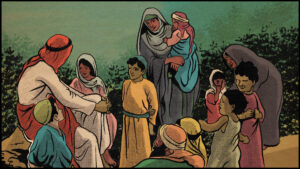


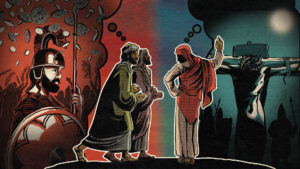
Here are some things to do, think and pray about in the week ahead:
- Jesus used children and welcoming them as an illustration again in this Mark passage. He even went so far as to say that whoever does not receive the kingdom of God like a child shall not enter it (Mark 10:15). Reflect on this. How are you like a child before God? Describe the child-like characteristics that you think Jesus wants us to display. List the ways God being your parent changes the way you pray or act or rest or think.
- In this part of Mark, Jesus calls his followers to be like servants and to be like children. In the first century, both servants and children had few rights; they would be expected to be humble, last in line and undemanding. Do one thing this week like a servant or child. Here’s some ideas to get you started:
- Let someone go ahead of you in line at the store or in traffic
- Over-tip your barista or server and thank them for their faithful work
- Wash everyone’s dishes in the breakroom at work
- Say ‘you’re right’ to someone instead of proving your own point of view
- Stop at a kids’ lemonade stand, drop a $10 bill and tell them to ‘keep the change’
Week 14 (August 13) : Mark 10:46-11:25
“The Final Week Begins”
- In Mark 11 we finally see Jesus entering Jerusalem and begin to walk out his death and resurrection just like he had been predicting to his disciples (Mark 8:31-33; 9:30-32 & 10:32-34). Where is the first place Jesus goes when he arrives (Mark 11:11)? Why do you think he went there? What does Jesus later do there and why (Mark 12:15-19)? How do the religious leaders react to Jesus? What point do you think Mark is making by telling this story at the beginning of Jesus’ final week?
- Mark sandwiches the story of Jesus clearing the temple within his cursing of the fig tree (Mark 11:12-14; 20-25). How do the two stories relate to each other? Look back at Jeremiah 8:11-23 and 24:1-10. The disciples would have known these verses and the Old Testament comparison of figs and the fruitfulness of the people of the Israel. They would have also understood ‘this mountain’ that Jesus refers to in Mark 11:22 as the temple mountain they’ve just walked down. How does knowing these cultural contexts help you in understanding this passage?
- Mark’s descriptions of events can be sparse, so we may lose some of the emotions and moods that were happening in the stories. What do you think Jesus’ emotions were during this last week? How do you think he felt riding into Jerusalem on a donkey while people cheered? How did he feel cursing the fig tree or clearing the temple? What commands does Jesus give in this passage (see verses 22-25)? How do these commands relate to the emotions that Jesus or the disciples may have been experiencing that week in Jerusalem?
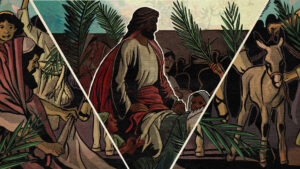
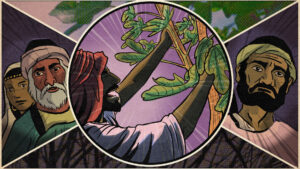
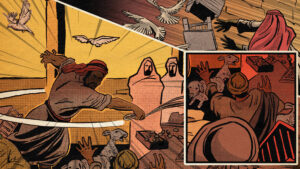
 Here are some things to think and pray more about in the week ahead:
Here are some things to think and pray more about in the week ahead:
- There’s an ancient way of engaging with Scripture taught by the 15th Century Monk, Ignatius of Loyola, where you read scripture and create in your mind a short ‘film’ of what you see, hear, feel, smell and even taste. In using it, our imagination can help us grow in knowing and loving Jesus more.
Learn more here, then try it with Mark 10:46-52. It’s a dry, dusty day on the roadside in Jericho. What do you hear, see and feel if you are someone in the crowd? What if you are one of Jesus’ disciples? Does what you are hearing or seeing change? Now imagine yourself as the blind man. How does putting yourself in each person’s skin help you see or understand Jesus in a new way?
- As Jesus and his disciples entered Jerusalem, the songs they could have been singing on the road would have been the Psalms. The words of the Psalms would have been as familiar to them as Christmas Carols or our favorite worship songs are to us. Scholars think Psalm 118 and Psalms 120-134 (The Songs of Ascents) were ones that people heading to Jerusalem for celebrations like Passover would have most likely sung. Meditate on Psalm 118 this week. How does it connect to Mark 11:1-10? How did Jesus’s life, death and resurrection give this Psalm a richer meaning than the original Psalmist may have understood? Perhaps this week you could try listening to some current renditions of Psalms like these from Shane and Shane or Sovereign Grace.
Week 15 (August 20) : Mark 11:27-12:17 “The Question of True Authority”
- One of the key themes of Mark is Jesus’ authority. Look at the ways Mark has pointed to Jesus’ authority from the beginning of the gospel (Mark 1:22,27; 2:10) and how he brings it up again as Jesus in in Jerusalem preparing for his death and resurrection (Mark 11:27-33). Review all the things we’ve seen Jesus have authority over in the past 11 chapters of Mark. How has your view of Jesus and his authority changed as you’ve walked through Mark the past four months? What does Jesus’ authority mean to your everyday words and actions?
- Read Mark 12:1-12. Explain the parable Jesus tells. Who do the various characters represent? In what ways was the Psalm Jesus quoted (Psalm 118:22-23) about to be fulfilled? What do we learn about the religious leaders from the way they reacted to Jesus’ teaching?
- Look at all the questions people are asking Jesus in this passage (Mark 11:27-12:17). What are some of the motives behind people’s questions to Jesus? How does Jesus respond to their questions (see Mark 11:29-30,33; 12:15-17)? What can you learn from Jesus about how you can respond to people’s questions about faith?


 Here are some things to think and pray more about in the week ahead:
Here are some things to think and pray more about in the week ahead:
- The original hearers of Jesus’ parable in Mark 12:1-12 would have known that he was adapting the prophet Isaiah’s story of the vineyard (Isaiah 5:1-7). Read the prophet’s words and compare them to Jesus’ teaching. In what ways did Jesus expand on Isaiah’s parable? How does knowing this Old Testament background help you understand Jesus’ teaching more deeply? Can you think of other Old Testament passages that help illuminate some of Jesus’ teaching in the book of Mark?
Consider how Jesus welcomed people’s questions and try this exercise. Take a sheet of paper and draw three columns. In the first one, write some of the common questions people ask about Christianity and following Jesus. In the second column, write the possible ‘question behind the question’ or someone’s motive in asking it. Finally, in the last column write a possible response. Use some of the resources listed on Week 11/July 23rd for help with your responses, if needed.
Week 16 (August 27) : Mark 12:18-44
“The Gift of Divine Clarity”
- In Mark 12:18-34, we continue to see people come to Jesus with all sorts of questions, just like in Mark 11:27-12:17. Who is asking these questions in Mark 12 and how did Jesus respond to them (Mark 12:26 & 29-31)? Do you think Jesus would have responded in a different way if his disciples or other non-religious people were asking about the resurrection or the commandments? In your own life, why is it important to consider who is asking you a question about faith before you answer?
- Jesus responds to the scribe’s question about the greatest commandment with not just one commandment, but two (Mark 12:28-31). How does the second commandment relate to the first? Look at Mark 12:32-33. How does the scribe take Jesus’ response even a step further? What are some modern examples of burnt offerings and sacrifices? How are they less important than loving God and loving your neighbor?
- In Mark 12, Jesus teaches about money and stewardship twice (Mark 12:13-17; 38-44). How are these two teachings similar and different? How do they underscore Jesus’s teaching on loving God with all of your heart, soul, mind and strength and loving your neighbor as yourself? What is Jesus teaching you in these stories about generosity and wise stewardship of your finances?

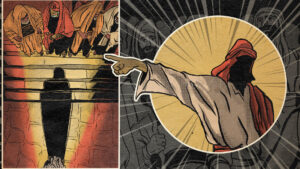
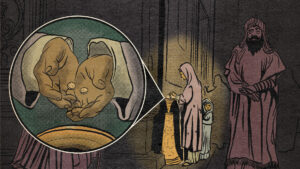 Here are some things to think and pray more about in the week ahead:
Here are some things to think and pray more about in the week ahead:
· Think through the past 24 hours and list all the things you’ve done. If you were to evaluate your daily activities through the filter of loving God and loving your neighbor, how would you do? What is one specific step you could take tomorrow the would make loving God and loving your neighbor a higher priority in your life?
- The story of the widow’s offering can make us look at the way we steward all of our resources from time to talents to money. If you want to take a deeper look at Jesus’ teachings on generosity check out these great books:
Week 17 (September 3) : Mark 13:1-37
“Coming Attractions”
- Read Mark 13:1-13. In the context of the passage, what were the disciples asking about in verse 4? How does Jesus answer them? Why do you think he replied this way? How do you think Jesus’ words may have helped the disciples when they recalled them during the early years of the church? Do you think they have any relevance for us today?
- Many people have tried to use passages like Mark 13, Matthew 24-25 & Luke 21 to make precise predictions about the return of Jesus. What does Jesus say about predicting his return? What illustration does he use to help his disciples know how to live while they’re waiting for his return? How does that picture help you understand how Jesus wants us to live now?
- In this passage, Jesus warns his disciples to “watch” or “be on guard” (see verses, 5, 9, 23, 33, 35 & 37). What do these words mean to you? Do “watch” and “be on guard” mean the same thing? Why do you think Jesus is warning his disciples this way? What are some practical ways we can stay alert for Jesus’ return?


 Here are some things to think and pray more about in the week ahead:
Here are some things to think and pray more about in the week ahead:
· Jesus’ warnings about persecution for his sake (Mark 13:9-13) are just as true today as they were 2000 years ago. Many Christians around the world are persecuted just as severely as the those in the early church. Learn more about what is happening to Christians around the world and how to pray for them here:
§ Open Doors Ministry: https://www.opendoors.org/en-US/persecution/countries/.
§ The Voice of the Martyrs: https://www.persecution.com.
· In Mark 13:13, Jesus reminds his followers that they will need patience and endurance to be able to hold onto their faith in difficult circumstances. Think on a specific situation in your life where you need endurance right now and try praying this:
Jesus, you said the one who endures in the midst of trials will be saved and restored in the end. I need your help to persevere in what I am walking in now. I can’t do this on my own! Help me to rejoice in hope, be patient in this tribulation and be constant in prayer (Rom. 12:12) through the power of your Spirit. Amen
Week 18 (September 10) : Mark 14:1-32
“The Final Pieces Fall into Place”
- What two Jewish Festivals are mentioned in Mark 14:1? Look back at Exodus 12. What did you learn about the meaning behind these two celebrations? Why do you think God chose for this to be the season that Jesus was crucified?
- In Mark 14:3-9, a large group is enjoying a wonderful meal together. What happens and how do different people in the room react? What do you think motivates each person’s reactions? Who can you identify with most in this story and why? Is there anything we can learn from this incident about worship and caring for the poor?
- In Mark 14:12-25, we see Jesus and the disciples sharing another meal together. What was the meal celebrating? What new meaning did Jesus give to two of the things they were already eating and drinking? How does what Jesus said (verses 22-25) help them better understand his death and his coming Kingdom? What does celebrating Communion mean to you and how does Jesus’ teaching in Mark deepen your understanding of the experience?
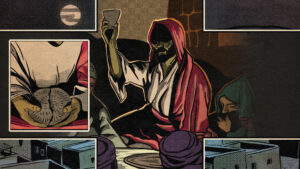
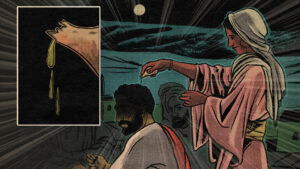
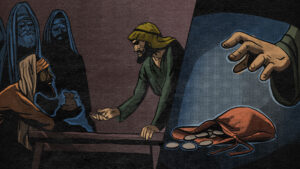 Here are some things to think and pray more about in the week ahead:
Here are some things to think and pray more about in the week ahead:
· God created us so that sharing a meal together binds people together whether it is two co-workers sharing a quick lunch in a break room or a room full of family and friends celebrating a wedding or a big birthday. So it’s not surprising when Jesus instituted the Lord’s Supper, he gave us more than something to say to remember him-he also gave us something to do, and he centered it around food and community. He knew this would change us in ways that simply reciting a creed or praying in our hearts could never do alone. This week be intentional in sharing a meal with someone and use the time to grow your relationship. Talk about significant meals and celebrations that each of you’ve experienced. Tell the story of what you ate and how it made the evening memorable.
· In discussing this passage and the Passover, Theologian N.T. Wright says that celebrating Passover says “loud and clear that despite appearances, we are God’s free people.” Is this same thing true for Christians today? Think of what holds people in bondage in today’s world. How are we set free from those things as Christians? Thank God for one specific thing that He has set you free from by committing to follow Him.
Week 19 (September 17) : Mark 14:32-72
“Crisis and Chaos in the Garden”
1.What did Jesus ask the disciples to do when they were in the Garden of Gethsemane (Mark 14:32-42) and why (see verse 38)? Did the disciples do what Jesus asked them to do? Do you think they could have changed what happens next in the story (Mark 14:43-50, 66-72)? Why or why not? What can you learn and apply to your own life from the disciples’ experience in the Garden?
2. Read Mark 14:53-65.What do you notice about Jesus’ response to the Sanhedrin’s questions that is different from his behavior earlier in Mark (for example in Mark 1:43; 5:43 and 8:30)? Why do you think Jesus chose to respond to their questions about his identity so openly now? How do the religious leaders respond? Is their response justifiable? Why or why not?
3. Put yourself in Peter’s shoes as he follows Jesus when he is arrested. What are his emotions and motivations? Recall the words that Peter heard Jesus say right after he confessed that Jesus was the Messiah (Mark 8:34-38). What effect do you think Jesus’ commands would have had on Peter in the courtyard? What warnings and encouragements can you draw from Peter’s experience?
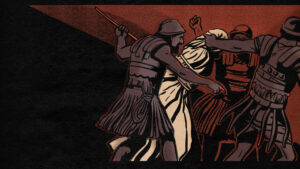

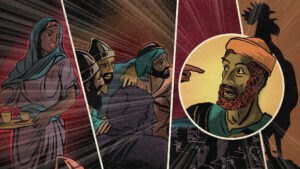

 Here are some things to think and pray more about in the week ahead:
Here are some things to think and pray more about in the week ahead:
· Many of the earliest heresies of the church hinged on Jesus being fully human and fully divine. Some people wanted to make him less than God and others wanted to elevate him beyond being human like all of us. Look closely at Mark 14. Where do you see the truth that Jesus is both God and human? Consider why this is such an important doctrine of Christianity.
· The great creeds of Christianity, such the Nicene Creed, were crafted to guard against heresies and to ground the Church in essentials of the faith. Read the Nicene Creed aloud today with a group of people—your family, your Bridge Group, or others that you are in community with—and affirm the truth of who Jesus is.
Week 20 (September 24) : Mark 15:1-39
“Tried and Crucified”
1. Read Mark 15:6-15. Imagine you are Barabbas. What have you done? What are you expecting? Now imagine you hear the crowd crying out “Crucify him!” What are you feeling? What happens next? How does putting ourselves in Barabbas’ story help us to understand Jesus’ crucifixion in a deeper way?
- Mark chooses to show Jesus’ crucifixion by stacking detail after detail, so that the tension and weight of the moment builds, although he’s moving quickly through the narrative. What small snapshots does Mark use to tell the crucifixion story (Mark 15:16-39)? What are some of the similarities you see in each snapshot? What do they show you about the larger picture that Mark is creating of Jesus’ death on the cross?
- What are some of the names people give Jesus while he is being crucified (see verses 26, 32 & 38)? Are these the same or different than the other names Jesus has been called throughout the Gospel of Mark (Mark 1:1; 3:11, 5:7, 9:7 & 14:61)? Who gave Jesus those names and why? What is ironic or surprising about what Jesus is called during the Crucifixion and who says it?





 Here are some things to think and pray more about in the week ahead:
Here are some things to think and pray more about in the week ahead:
· Although they tell a unified story, each Gospel writer brings a unique perspective to the story of Jesus’ crucifixion. Compare the narratives in each Gospel:
- Matthew 27:27-54
- Mark 15:16-39
- Luke 23:26-48
- John 19:16-37
What details are unique in each of the Gospels? How do all them work together to give you a fuller picture of Jesus’ crucifixion?
· Pause and reflect on the reality that Jesus died on the cross for you. What difference has that made in your life? Spend some time thanking Jesus for dying on your behalf.
Week 21 (October 1st) : Mark 15:1-39
“The Resurrection of Jesus”
- Read Mark 15:40-47. What words and ideas do you see repeated? Remember that Mark is the first Gospel written and the earliest account we have of Jesus’ life. Why would it be important for Mark to be so detailed in what happened to Jesus’ body after the crucifixion?
- Mark 16:1-8 tells the story of Jesus’ resurrection. Who is present at the tomb? What are they told to do? Now look back at Mark 8:31-38; 9:30-32; 10:32-34 & 14:26-31. How do these earlier words of Jesus connect specifically to what the women see and hear resurrection morning? Which details in Mark 16:1-8 are most important in light of Jesus’ earlier predictions?
- Look back over the entire book of Mark. If time allows re-read the Gospel in one sitting or at least read back over all of the chapter headings to remind you of the journey we’ve been on the last several months. What is your biggest takeaway from the Gospel? How has your understanding of Jesus grown, deepened or changed? What is one specific way your life will be different because of the time you’ve spent studying the book of Mark?
Here are some things to think and pray more about in the week ahead:
- As may be noted in your Bible, the earliest and best manuscripts of Mark’s Gospel end at 16:8, and most scholars agree that verses 9-20 contain various Greek words and expressions that are uncommon in the rest of Mark. If you’d like to learn more about the questions and scholarship surrounding the end of Mark, check out these resources.
- The “Missing” end of Mark’s Gospel: An article from the Bible Project
- What do you do with the End of Mark’s Gospel? : An article from the Gospel Coalition
- How can you trust the New Testament when the original manuscripts are different?: A short YouTube video by Daniel Wallace, Biblical Scholar & Executive Director of the Center for the Study of New Testament Manuscripts
- Many scholars believe one of Mark’s purposes in writing his account of Jesus’ life and ministry was to balance other early church views that overly emphasized Jesus’ glory and power and excluded his humanity and suffering. This caused some early Christians to assume that they wouldn’t experience suffering and that they’d quickly experience glory of life with Jesus. Look back in the Gospel of Mark. Where specifically do you see him arguing against this view? Why do you think it was important for early and current Christ followers to know that Jesus was fully man and that he truly suffered?

